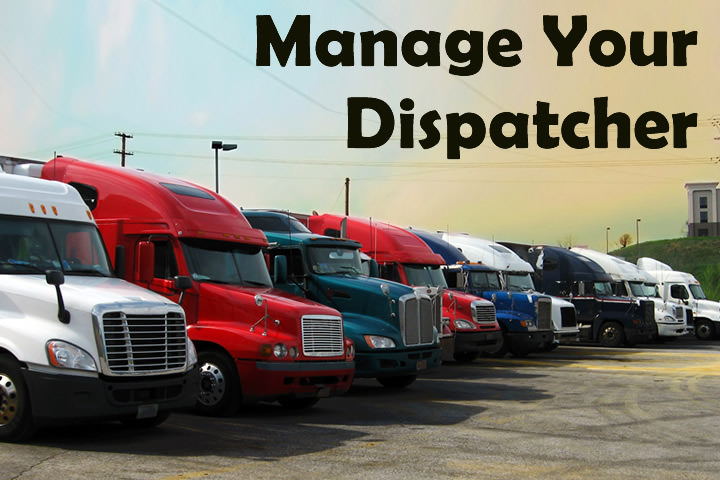As a truck driver, one of the most essential relationships that you will have is between you and your dispatcher. At the same time, a lot of truck drivers have struggled to get along with their dispatchers must less manage your dispatcher. In this industry, they don’t come from the same mold that they used to, and in many cases, your dispatcher may have a college degree, but they have no experience working in the transportation industry. This makes for some of the most trying experiences as miscommunications and other problems arise. At the same time, this person acts as the lifeline to your company, and if you want to be successful, you must learn how to get along with the dispatch manager.
Understanding the Dispatcher’s Responsibility
When you first get started in truck driving, you have a responsibility to the position you have chosen. You have to know about your career. Most likely, you have to start at the bottom of the company ladder and work your way up the totem pole. Naturally, you got into this job for the freedom. While dispatch doesn’t necessarily act as a supervisor, they do give you a lifeline between you and the company. They have a responsibility to manage the software and give you instructions so that you know where to proceed. In essence, dispatch acts as the gatekeeper that has the knowledge of how to proceed with you and your carrier.
Understanding the responsibilities of dispatch, it can help you to know where they might be coming from. When a dispatch worker has to perform responsibilities, they must manage the flow of the freight, and they have to help you take it from Point A to Point B. The goal behind a dispatch worker comes from maximizing profits and lowering the number of empty miles traveled. In addition, they control how many miles traveled that you will get paid for. As an over-the-road trucker, you get paid by the mile.
Don’t Argue
Many times, you might feel like your dispatch worker doesn’t listen to what you said. You have to give them the benefit of the doubt, however. These workers will have to manage the software, and they will work with the sales teams, which means they have to juggle many balls and keep them in the air without dropping them. Another unfortunate problem is that the vast majority of dispatchers in today’s world have never worked as a trucker. This means that they don’t understand the business as well as what they should, and sometimes, they don’t have as much understanding as what they need.
Getting into an argument with your dispatch worker won’t accomplish much, other than high blood pressure. Everyone involved should reach a mutual agreement. Try to handle the dispatch worker with care and understanding.
Manage Your Dispatcher: Get Everything Established Upfront
Let’s say that you have been assigned a new load. You should establish a couple of things up front to keep things peaceful. First, you set the scheduling, not the dispatch worker. You’re the one who has to fight the weather, traffic and everything on top of it. You have the driving experience, and you know how to get it going. Most likely, this dispatch worker has never even worked in trucking, which can cause a lot of problems if you let them set the scheduling. You should be the one to establish the schedule for delivery. The dispatch worker will most likely try to dictate where and when you have to be. However, you can look at him and say, “I will do my best.” Never make a promise to the dispatch worker because it will come back to haunt you. You can encounter many uncontrollable variables during the trip, and you want to leave plenty of wiggle room to ensure that you can deliver the load on time.
Manage Your Dispatcher: Get the Details of the Trip before Departure
Before you ever take off, you should have the details of the trip fully prepared. For example, take a look at the mileage, propose the schedule for delivery, and present what type of obstacles might arise. You should also get a good understanding of who will take care of what. For example, you want to know who handles the customs papers. Most experienced truckers will tell you that it helps to have these things established right from the beginning. Responding to the words, “It needs to be there by…” you can simply say, “I will do my best to get it there by that time.” In this way, you haven’t made any promises that you will regret later if you fail to deliver it on time.
Manage Your Dispatcher: How to Handle Unrealistic Demands
One of the biggest complaints that come from the truck driving industry is that the dispatcher makes unrealistic demands. They don’t know enough about trucking to give you a realistic demand because they have never been involved in the industry. As a result, they make crazy big promises to customers and have to follow up with them. This can create some obvious problems, and some of the newer drivers will feel a lot of pressure as a result of this. Let’s say that the dispatch worker refuses to accept the line, “I’ll do my best to deliver on time.”
If they refuse to accept this, ask to speak with the safety supervisor because legally, they cannot risk your life. Having this supervisor around is for ensuring that you don’t get forced into unsafe business practices, and also, this supervisor protects the company from problems like the one outlined. Most likely, the problem will get resolved quickly, and your dispatcher will have a newfound level of respect for you because they will understand not to pressure you like this because you will turn to the safety department.
Whenever you have an unreasonable dispatch worker, the safety department will be your closest ally and friend. They will protect you from these types of abuses. In addition, we recommend that you get this type of conversation in writing. You might respond through email and say that you feel tired and say that you can deliver on time. In this way, you have a written record of what happened. The trucking company could face serious trouble if the site auditor or the scale master were to see the message, and they realized you were being forced on a run despite the dangers.
In the trucking business, you can run across good dispatch workers and poor ones. Sometimes, you will work your hardest to get along with them, and they will still cause problems. However, if they ever try to push you too hard, you can speak with the safety supervisor, and this normally clears up misunderstandings pretty fast












